|
|
|
 |
Chapter II
The Pirate's Treasure
From "The Land Of Rip Van Winkle" (1884)
By A.E.P. Searling |
|
|
In one of the old colonial mansions of New York, facing on the Battery, two men sat at a table drinking. The firelight, flaring up about the great log in the chimney, cast fitful gleams on their differing faces. The elder of the two, Colonel Fletcher, ex-Governor of the province of New York, was a man past middle life, thin and dry, with a sharp-cut, beardless countenance, in which were set two little bead-like eyes that seemed ever wandering in search of evil things. Their expression belied all the suavity of the man's face and manner; they told you that their owner was cognizant of all your weakness, and perhaps of many of your peccadilloes, should you conduct yourself never so discreetly, and at some unwary moment you might find yourself in his unmerciful clutches. His powdered peruke was arranged with the same fastidious care that evinced itself in the disposition of the rich lace framing his slender, aristocratic hands. His entire person bespoke a taste and elegance hardly removed from foppery, from his red velvet coat, parting in front to reveal the deep lace frill on his bosom, to the gold buckles on his shoes and at his knees. His companion was a man of quite another stamp, and something in his attitude as he sat with crossed knees and back half turned, looking toward his friend only when he spoke, betokened a certain scorn of Fletcher's foppery and ill-concealed meanness. The older man was leaning forward with folded arms resting on the polished mahogany of the table, keenly eying the large bulk of his guest, as if weighing the truth of the marvellous tale he had just heard.
Of tall and finely developed figure, our hero was clothed in some dun-colored vesture, without ornament save his decorated sword of Moorish make, and the sash which held it at his waist. This was of a deep-red color, and of soft silken mesh, with two tassels at the end. His hair was brown and unpowdered, contrary to the prevailing fashion, and cropped closely to his head, where it clung in little rings. He wore long mustachios, curling up at the ends like a Spaniard's, and his complexion was swarthy as if browned by foreign suns, while his eyes of light gray had the ab sent unseeing expression that so often characterizes a person of minute observation. Suddenly turning to his companion, he let his fist come down on the table, so that the glasses rung, swearing a round oath, and concluding his malediction in some foreign tongue.
|
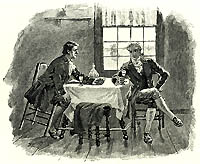
Capt. Kidd And Gov. Fletcher |
"I tell ye, 't is a mighty treasure," he went on in tones of suppressed excitement," a Moorish merchantman bound home from India, and richly laden, as ye may guess, with what ye already know of such-like cargoes!"
At this insinuation Colonel Fletcher stirred uneasily, and removing his eyes from the swarthy face now turned to him, gazed into the fire. Whether he saw there visions of gold and silver and precious stuffs, or some new plan to help him out of his difficult situation, I do not know, but presently he stole a sly glance at the now averted face before him.
"But, Bellomont-" he said softly. |
The eyes flashed round in sovereign contempt. "A fig for your Bellomont! I snap my fingers! Those six fine rubies I sent to her ladyship, the countess, have whetted his appetite, and what though he thundered and fumed and cast me in prison? Here I am, out on some flimsy pardon, and those pretty baubles in his wife's jewel-casket have changed my title from 'pirate' to 'privateer in His Majesty's service.' And yet I tell ye he'll scarce dare to let me pass in openly with my sloop-loads of treasure, much less let me bring that great ship here in open sight. That troublesome make-mischief of a Robert Livingstone too - may the Devil fly away with him! - is growing suspicious, and must needs come posting down from his manor to see what the Earl of Bellomont means by liberating me. But leave that to me. I 've a trap for his fine loyal principles! All I want of you is a well-rigged sloop and twenty sailors to go down the coast with me where my bulky prize rides at anchor, and help fetch away the treasure. You 'll be well paid for 't, man!"
"Captain Kidd," said the older man, rising from his chair and straightening his tall, spare figure, " I accept your offer and will sign the contract. My remuneration should be heavy, for you well know the risk I run under the new laws against harboring pirates, should you be convicted of so grave an offence. I make this agreement with His Majesty's privateersman,' and he made an obeisance before the bold adventurer."
"Done!" cried the sailor, starting up, and setting down his glass so emphatically that it shivered to atoms on the table. "Have your craft off Broecklyn, near the Wallabogt, at the first ebb-tide on Monday next.."
"But the girl," broke in Colonel Fletcher, " I... I can't engage
to keep her on account of... of my lady."
The captain's brow darkened. "Why not, man? She's as honest a woman as treads the earth, and I tell ye she 's no man's wife! I mean to marry her myself, but how can I prove the lie on that infernal villian of a Balldridge in time to get off on my cruise next month? He says she's a slave, and that he bought her, and I say he lies! She 's a Spaniard, and as white as you are, and he stole her from a ship they took in the South Seas. I want to keep her safe from him till I come back from this one more venture."
Colonel Fletcher shrugged his shoulders and replied only: "It is a simple thing to find asylum here. As for me, my wife likes not a comely maid about the house."
"Lest she be beguiled of your fine person?" sneered Kidd; "well, let be, I 'll not trouble you, unwilling to guard that treasure, lest I find it but ill-kept against my return."
So saying, he stalked out, with footfalls resounding on the oaken floor, and his form was soon lost in the darkness of the street. What business he next applied himself to appears in the fragment of an old document, being a letter from the Earl of Bellomont to the Board of Trade in the mother country.
"I forgot in my last letter to their Lordships to acquaint them with an arch piece of villainy done by that rogue of a chaplain whom I have since dismissed. He goes to the Lieutenant-Governor and desires him to sign a blank marriage license, pretending the parties thereto wish to keep their names concealed. The Lieutenant-Governor, suspecting mischief, refuses to do this, and my chaplain goes away. Afterward my good man brings another license, containing the names of Captain William Kidd and Isabella del Puerto, who has come, it seems, in his ship from the South Seas. Since then it transpires that he took her forcibly from Balldridge, the pirate, who says he bought her as a slave, and took her for a wife. Kidd, however, with his usual villainy, abducted her, and she is hidden past finding, for Kidd swore he would give up his life sooner than disclose her whereabouts." The letter is dated some time after Kidd's apprehension and confinement, on his return from his projected expedition just alluded to.
At noon on the following Monday a smart little craft was standing on and off shore near the Wallabogt, where soon appeared a sloop bearing down toward her. Some signals were exchanged, and the two vessels bore away to Sandy Hook and disappeared from sight of shore. Not many days after they returned heavily laden, and to the excitement and intense curiosity of the New Amsterdamers waiting on the Battery for their landing, passed on up the river, hugging the west shore, as if to baffle curious eyes. Farther up the river they cast anchor.
Just at nightfall a boat put off from one of them, and in a little while Captain Kidd was striding unobserved through the town, until he reached a place where streets converged and got themselves into a hopeless snarl. Here, turning a sharp corner, he ran bump against a man, who cried: "What, ho! my bold captain, well met!" and Colonel Fletcher pushed him about and gazed inquiringly into his face.
"Greeting to you - greeting!" cried the captain impatiently. "Let me pass!" and brushing off the detaining hand, he hurried on with a curse at this untoward meeting.
"A-ah!" softly said the wily Fletcher, "so that is the game! He takes his bird up river with the gold!"
Kidd stopped at last before a low doorway, and gave a gentle rat-tat with the big brass knocker. The house was a small one, standing like most of the houses of that time with its gable-end to the street, and the entrance was through a peaked-roofed stoop, on each side of which were benches, where the good burghers were wont to sit of a summer evening and smoke the pipe of peaceful domesticity.
As our hero waited and listened for an answer to his summons, the step of a passer caused him to draw back in the shadow. While he waited, the man came opposite to him and he recognized the gait and figure of the hated Balldridge. At the same instant a lighter step in the hallway caused his heart to leap up, for Balldridge had paused there looking up at the house. What if the door should open and a light, held high above a lovely head, should reveal the features of her whom he was hiding from this fiend, standing here not six feet away in the darkness? His hand reached out and grasped the door-handle, but the pirate passed on, apparently satisfied in his search.
Not long after this episode, two figures came out of the house, one muffled and veiled, the other full of anxious cares for his companion, lifting her over the puddles and rough places, pulling her shawl closer about her slender shoulders, and often supporting affectionately the lagging steps. Once in the little boat and off for the vessel, the Spanish maiden - for it was she - seemed to revive in courage and in spirits, and all the voyage up the beautiful river she spent in gayety and happiness, with her husband, the pirate captain, or "king's privateersman," as Bellomont had now made him.
Soon he was to go on the king's bidding, by means of Bellomont, to fight the pirates in "the Red Sea or elsewhere," but on his return he would settle down in the New World with this beautiful wife, and live a new and happy life. So they dreamed and loved each other, on this strange bridal journey, being happy and gay, for was not danger and that dreadful Balldridge behind them? And though parting was so near, it would not be very long to wait - two years at most, - and then peace and prosperity for the rest of their lives. Meanwhile she was to find protection with an old negress whom Kidd knew, and who lived in a little house at the foot of Kaaterskill, or Palenville Clove, by the wonderful Catskills. She could wait for him in that charming little mountain nook, and surely none could find her there. His had been a life of wild adventure and many daring and successful exploits, and the warm autumn days passed quickly as they sailed along, beguiling the way with tales of the past. She, too, had suffered privation and dangers, as stolen from her father's ship now a year since, she had been passed over to the cruel Balldridge as his slave, and had been rescued a few months after by Captain Kidd, in a fight with his pirate crew in the South Sea. She had soon learned to love her deliverer, who treated her with a gentleness and deference as extreme as his harshness and severity to others. No knight of old was ever more noble in his lady's eyes, than this pirate of world's renown in the sight of the romantic Spanish girl. Doubtless she made no fine-spun analysis of his moral deviations, and to her, his seizure of other men's ships on the high seas was no theft, but an adventure in which daring and danger played equal parts, while crowned monarchs watched the deeds of her hero. Now that he had promised to amend his life and was about setting forth on an expedition as a loyal subject of the English king, any wrong, if wrong there was in him, was wiped away.
- It is a pretty picture, of which tradition gives us but a glimpse or hint, this brief idyl in the wild life of Kidd ; the slow sail up the broad river in the October haze of the faded days of fall in this enchanted region. In and out of the Highlands, where Anthony's Nose was only a high purple mountain of tremulous sunshine, and the gorgeous foliage of many tints came down to the water's very edge, and leaned over to see itself in the placid river; past Esopus, hidden up its winding creek, and so to Catskill, where, after many calms and delays, they at last arrived, and the beautiful water-journey was ended.
|
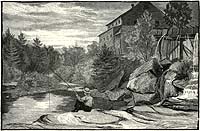
Old Woolen Mill At Palenville |
Here they lay at anchor for two days, while Captain Kidd went among the friendly natives and settlers, trading and giving out that he and his friends came here for the fishing and for furs which they wanted in trade from the Indians. On the third night there came on board an Indian who drew the captain aside to give him some information, and in an hour's time twenty men went down over the side of the larger sloop into boats which were there in waiting, and last came the Spanish girl, cloaked and veiled as before. Each man carried on his shoulders a leather sack which seemed very heavy.
|
|
Arrived on shore they took a path leading around the village through the woods, avoiding all observation and proceeding in complete silence. So they passed on over the hills toward the mountains, coming in the early dawn to the opening of the Kaaterskill Clove. Here the men were marched with care into a thicker part of the forest, and their captain and the lady struck off by a side path toward the outskirts of the little settlement. Just where the road coming out of the clove now divides, stood then a little hut, where lived alone an old Madagascar negress, shunned by the whites and the Indians. Over the few black slaves held then by the early settlers she exercised great power, for they feared her and yet paid her a half-worshipful deference. At the time of our story, the latter part of the seventeenth century, the old quarrels between the Patroon Van Rensselaer and the government of the colony having been long since settled, a good title could be given to purchasers of farms in the valley, and the holders rendered safe from the autocratic seizures of tithes and imposts by the old Patroon, who had tenaciously claimed the region, and hence these rich lands were being rapidly settled and cultivated. In the prosecution of such labors, the farmers from time to time sent to New York, or as the Dutch still insisted on calling it, New Amsterdam, for slaves, and in one of these consignments had come old Dora, the negress just mentioned. She had presented free papers, or rather a document certifying that her freedom had been bought, and she had given the price of her passage to Catskill, wishing, she said, to live near the mountains. She seemed to be supplied with money sufficient for her needs, and wore about her unusual signs of prosperity, such as great shining silver hoops in her ears, and a heavy string of beaten silver beads of rude manufacture about her neck. All these peculiar circumstances, and her wish to live alone in a strange, far country up the river, caused even her white neighbors to regard her with suspicion. Long years after, the story gained currency that it was Kidd who sent her, with just the contingency in mind, that there would come a day when she would prove useful in helping him to conceal his treasures in these haunted hills.
To this woman Kidd took his bride, and left her with many kisses of farewell in the tender care of the negress. The old woman went out with him for a moment to a place behind the hut, and there received from him certain orders and advice, and, doubtless, also good gold, and for many days after she absented herself for several hours, saying it was at his commands. Perhaps she was carrying the bags one by one to places of concealment on the mountain, where some day their contents will astonish and delight a hardy explorer, climbing up to the hidden caves and deep crevices that seam their rocky sides. However that may be, the men must have left their burdens to her care, for they were back on their boats by night again without taking time to climb up through the clove.
This treasure was the contents of one only of the sloops, and what was done with the rest is matter of comment to this day, and the men have been not a few who have sought them up and down on both banks of the river. The remaining treasure was probably buried somewhere between New York and Catskill, for the sloops returned empty, and the rest of the goods of the Moorish merchantman were disposed of in other directions, the vessels making no further voyages up the Hudson.
Soon after this we have records of the new compact Kidd made with the Earl of Bellomont, governor of the provinces, and Robert Livingston, whom Kidd had probably taken occasion to visit on his return down the river, the Livingston Manor being about twelve miles below Catskill, on the east bank.
Articles of agreement were drawn up between Kidd, Robert Livingston, and Bellomont, by which the earl was to pay four fifths of the cost of a ship to sail to "the Red Sea or elsewhere," and also to procure a captain's commision for Wm. Kidd, in the royal navy, Livingston to pay the remaining fifth of the ship's cost, while Kidd bound himself to the king's service, and if he secured no treasure was to give up the ship on his return. The agree ment begins as follows: "Whereas the said Captain Kidd is desirous to obtain a commission as captain of a private man-of-war in order to take prizes from the king's enemies, and otherwise to annoy them, and whereas, also, certain persons did some time since depart from New England, Rhode Island, New York, and other parts in America and elsewhere, With an intention to pyrates and to commit spoyles and depredations against the laws of Nations, in the Red Sea or elsewhere, and to return with such goods and riches as they could get, to certain places by them agreed upon, of which said persons and places the said Captain Kidd hath notice, and is desirous to fight with & subdue the said pyrates with whom the said Captain Kidd shall meet at sea, in case he is empowered so to do, and whereas it is agreed between the said parties that for the purposes aforesaid, a good and sufficient ship, to the likeing of the said Captain Kidd shall be forthwith bought, whereof the said Captain Kidd is to have the command."
All of which was duly and promptly done, and in the year 1695 our gallant hero sailed away a full-fledged captain in the king's service, "with white sails flowing the seas beyond," but never more to sail the peaceful waters of the river, where awaited him his dream of love and peace and happiness. Even the dream soon proved false, and faded, for rude hands disturbed his little mountain nest, and once more sorrow hunted forth the bird it had sheltered.
In the spring following Kidd's departure, a new settler came to the valley lands under the mountains. Five hundred acres were bought near Leeds, and a large stone house, with suitable out buildings for the cattle and slaves, erected. The owner was a stumpy, cruel-faced man, with a sunburned, sailor look, and a manner full of vulgarity, while his speech was plentifully interlarded with oaths. He maltreated his slaves, frequently administering unmerciful punishments, such as hanging by the thumbs and tying the tongue with a tightly-drawn cord, until his neighbors shunned and loathed him. He seemed not to lack money, for he pushed the building and cultivating of his farm in a way that involved great outlay, and caused the frugal Dutch to marvel greatly, and to wonder from what land of plenty this prodigal stranger hailed. He had no family and no companion, and as autumn came on, and the work of settling was nearly finished, a loneliness and restlessness seemed to take possession of him, and then he would wander away on his horse, spending whole days in the mountains, as if seeking some one.
Meanwhile how fares our Spanish beauty in her hiding-place? All through the long winter she had pined and drooped, sitting sadly in the little cabin while the old negress went out on her daily ramble among the hills. Nothing could curb these restless roamings, not even the deep snow, for the creature had improvised a kind of snow-shoe, and on these she kept up her daily habit of wandering. Among many other crafts she had learned shooting with the bow and arrow, and seldom returned without some small beast or bird to tempt the appetite of her guest. Daily she tried to draw the maiden with her, but in vain; the poor girl only shook her head sadly, and shuddered as she glanced at the snow outside.
One day the negress said to her in the fragmentary Spanish she had learned somewhere in her wanderings: "Come now, I have a great wonder to show you - only this once; I will not ask you again."
As if to buy peace at any price, the young girl rose and suffered herself to be equipped for a mountain climb. On snow shoes, she followed her guide up a winding trail and then over a level stretch, coming toward the amphitheatre where the fall of the Kaaterskill drops over seemingly, from one point, into bottomless space. Clambering down the deep ravine, her mind lost in far off thoughts, the Spanish lady reached the bottom of the first ravine, when her guide seized her arm and pointed upward. |
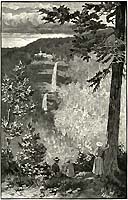
View From Prospect Rock - Kaaterskill Falls |
To the half-blinded eyes of this daughter of the South, who had never beheld snow and ice before this dreary winter, a miracle appeared, and, subdued by its power, she devoutly crossed herself. From within a few feet of them rose a shining white tower of glittering ice, touching with its apex the cliff above. Dazzled at first by the excessive brilliancy of reflection, the eyes could perceive nothing but the white blinding light of it all, but at last, accustomed to the glare, Isabel perceived through the ice walls the stream, leaping forth and breaking into spray, but perfectly noiseless. It was a phantom waterfall, enchanted and bound in this prison of ice. All round the circular edge of the cliff above, great icicles fell in a crystal fringe, reflecting the sunlight in all the prismatic tints, a blazing border of green and orange and rose-red jewels. Beneath the frozen lake on which the great tower stood, the stream slid silently away to the lower fall where it broke into a thousand waves, making the second cataract a great frozen wall of plunging waters.
|
The maiden was much moved by all this, and from that day forth, no longer declined to accompany the black woman on her rambles. As spring crept up the mountains, they fished in the swollen watercourses or hunted for sweet cresses or the flowering arbutus. Each changing month developed some new treasure of nature which the old woman's wood-lore readily found and appropriated. So passed away the summer, and autumn found the captain's bride more cheerful and even merry at times.
One October day the two companions were seated with their basket beside them, on the cliff above Fawn's Leap. All the vivid tints were on the foliage once more, and the same purple haze through which she had sailed hither last year, was filling the heart of Isabel with sad thoughts as she leaned back with hands clasped behind her head. Startled suddenly by the crackling of branches and the sound of a human voice beneath them, she sat up and leaned forward to observe the intruder. The voice went on talking as if the man spoke only to himself: ‘‘She must be about this clove somewhere; Fletcher said it all went here, from that sloop, and the girl went with the gold. A curse on the coin! I want the girl! Let Fletcher find the gold for himself!"
Isabel listened with a beating heart. The old negress had fallen into a doze, and, seated a little way off, kept her head resting on her knees. The girl looked at her and made a rapid calculation of the time necessary to waken her and escape through the bushes; then, looking more closely at the man below, she recognized the hated Balldridge, and all discretion fled from her, even the power of thought, as the wild instinct of flight alone possessed her limbs. In a moment she had sprung from rock to rock across the stream, and was dashing through brush and brier in a blind effort to escape; but in that moment the pirate had seen her, and, springing up the mountain side, made short work of so unequal a chase. He caught her near the open trail that led up through the clove, and quickly securing her struggling form, regardless of cries and remonstrances, to his horse which he had tied there, bore her down to his home near Leeds, for he was the stranger who had
built the fine new house there. Not a word did he exchange with her till safe and fast in his stone prison he had her at his mercy, and then the blacks told fearful tales of the sounds that issued from the room where she was locked in.
|
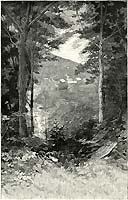
View From The Toll-House At Palenville |
Each day the "mas'r" would go to her, and the tones of his voice through the closed door would sound almost gentle, as he seemed to plead with her, but the replies were too low to be heard. At length his words would grow louder, and curses came thicker and faster, while the answers were still the same; at last, blows and shrieks would come forth, frightening all the servants from the house. Presently the door would slam, and the master would stalk forth to visit his still unsatisfied rage on whatever crossed his path. He said he had a runaway slave in that room, and warned the rest not to merit a like fate.
Through all the long winter no one ever saw the face of this runaway, but through many a night the blacks heard her footsteps as she paced back and forth - and sometimes her sobs. At last, when spring had returned, one morning she was gone. Balldridge raged and cursed, but in vain; no one knew aught of her method of escape, though the blacks believed that some supernatural power had spirited her away from her tormentor. The tormentor, however, had quite a different suspicion, for under the window were two pairs of footprints, and all went in the direction of the mountains. |
The ensuing month he spent searching for the hut of the old negress. Somewhere in the Kaaterskill Clove he knew it must be, though he had no certain information even of that.
Again poor Isabel was back with her old protectress, but only a shadow of the Isabel who had been carried away the previous autumn. Haggard and thin, she sat all day gazing with her great wild eyes into the fire. Every expression, save terror, seemed to have left her face, and that emotion was written in every line of her shrinking form. The old woman has hardly been able to leave her side since the escape, so distraught has the poor girl been at the mere idea of being alone. This morning, however, wood must be brought for the fire, and meal from a neighboring farm, so with many soothing words and charges to keep closely within doors, the negress leaves her for a few hours. Crouched down in the chimney-corner, the girl awaits hour after hour the returning footsteps. At last, soothed by the continued silence and the loneliness of the surrounding forest, she leans her poor distracted head against the bricks and dry mud that form the chimney, and falls into a deep sleep. Perhaps it is a dream of the river journey that comes to her - that voyage that seems now so far off in the past, - or perhaps it is a vision of the new life she is to enter with her gallant lover when he returns from his pursuit of the king's business. Whatever the picture may be that merci ful sleep has painted, its glory has lighted up her face and fixed a smile on her lips. Some one comes creeping in at the half open door, some one steps softly over the clay floor and stands over her, and the some one holds in one hand a cow-hide whip, and in the other a coil of stout hempen cord. On the stooping face is a baleful look, more powerful, seemingly, than whip or rope, for the sleeper stirs uneasily, the light leaves her face, and she slowly opens her eyes. There is not a sound between them, and the girl presses her eyes shut with her hands as if thereby to dispel a hideous nightmare that has somehow turned up among her dream-pictures, then opens them again to behold the dreadful picture still there. Still not a sound does she make, till Balldridge raises himself and says between his set teeth:
"Get up, and come with me!"
Then she springs away from him, throwing her arms wildly above her head.
" I will not - I will not! I will die before I go back to that dreadful house and - and you!"
Here a shudder of inexpressible loathing seizes her and she rushes toward the door as if a remembrance of some cliff near by had suggested to her an easy method of ending the misery to come. But Balldridge is too quick for her, and soon has her bound, and is hurrying to his horse in the path below the bill. Here a brilliant device occurs to his fiendish invention, and he ties one end of the cord round her neck, attaching the other end to his saddle.
" Now, my lass," he cries, as he springs on the horse, "this time you may walk, and we'll see if you're in a hurry again to run away to that she-devil among the hills ! "
Whether the girl cried out, or made some backward move ment, or whether indeed the spur pricked too sharply, is not known, but the spirited horse plunged suddenly, pitching his rider headlong before him, and dashed off homeward. Poor Isabel's miseries were soon at an end, for death must have quickly ensued. Certain it is that her body was dashed literally to pieces against the rocks on that awful journey, and the horse arrived at his stable with only the worn and broken cord dragging behind him.
So brutal a murder, even of a slave, found some punishment in the imperfect administration of justice in those early days. Balldridge was found guilty, but some interest, presumably his gold, softened the sentence. He was to be hung - when he arrived at the age of ninety-nine! He was also to present himself to the judges of the court, once each year when court was in session, wearing always a cord around his neck as a memento of his crime.
So he wore out his wretched days, hated and feared by all who knew him, and in his old age they say he wore always a silken cord about his neck.
The scattered remains of the girl were collected and buried by order of the court, opposite his house-door, where a stone, telling the story of her death, should face him as he passed out. But he nailed up the door and no one ever after used it. The strangest part of his story is that he actually lived to be ninety-nine years old, though no one then could be found who would have molested the old man, already punished by a long life of loneliness and fear.
The house where he lived has been haunted ever since, and though now in ruins, it is said that in one corner where stood the room in which the hapless Isabel was imprisoned, all night long footsteps go pacing back and forth, and sobs and wails and bitter sighs afflict the night air. A great white horse with fiery eyes comes tearing down the road toward Leeds, dragging a ghastly shrieking ghost, but sometimes both horse and ghostly woman take on the form of skeletons.
As for Captain Kidd, he never returned to claim his bride. He sailed to the Red Sea as per contract, but he seems to have been unable to resist the spell of his old outlaw life, for instead of capturing the pirates, he joined with them once more. He was at last captured and taken to London, says the old chronicle, and was hanged. The last glimpse we have of him in our old New York documents is where the Earl of Bellomont falls under some slight suspicion with the Lords of Trade, of having connived somewhat at Kidd's piracies in the hope of gain for himself. Their Lordships viewed with disapproval that fine scheme of Livingstone and Bellomont to "set a thief to catch a thief," and so they set inquiries on foot, thereby worrying the Earl into shifting most of the blame on Mr. Livingstone.
In a letter to Vernon, the secretary, the Earl says: "There 's no intricacy in all that matter," and further on he continues, " - and ye success, I believe, had been very fortunate and serviceable, had we not been persuaded by Mr. Livingstone to put the ship under the command of a most aband'd villian, for we were all of us strangers to Kidd, but employed him on Mr. Livingstone's recommendation of his bravery and honesty, but he broke articles with us, for, instead of sailing direct to those seas which pyrate ships do frequent, he came hither directly to New York and loytered away several months; and Mr. Livingstone hath told me that there was a private contract between Colonel Fletcher and Kidd, whereby Kidd obliged himself to give Fletcher 10,000 li. if he made a voyage; Mr. Livingstone told me this was whispered about but he could not get any such light on it as to be able to prove there was such a bargain between them," ... "for mine own part I never saw him (Kidd) above thrice, and Mr. Livingstone came with him every time to my house in Dover Street."
No doubt this bargain dimly hinted at between Fletcher and Kidd was payment for the loan of Fletcher's sloop. Whatever their bargains, their sins and their frustrated dreams, they have probaby long since cleared them all up, for governor and pirate, Livingstone and Fletcher, Kidd and his Spanish maiden, had joined the great procession of " dim sheeted ghosts many a year before we threw over our colonial governors along with that fateful tea in Boston harbor, and all other British abominations.
"Oh, thank you!" cries Miss Polly, as the story is ended; "I am sure I shall think of that poor girl at every spot you have mentioned in your story! I shall not be able to climb through that ravine of the Kaaterskill Clove without a wild desire to run from Balldridge, and I shall just shi-i-ver when I see that old hut if it is still there!"
Here a diversion was made by Captain Oldbore, who had come up during the latter part of the recital, and who had restrained himself thus far with difficulty.
"Why, man, that 's the most absurdly inaccurate thing I ever heard! All that about the dragging at the horse's tail is another story, and of itself was pure fabrication, you must know! Of course as to the coming of Kidd up here, that 's likely enough, though how far up he came is not settled, but the rest, oh, pish ! "
|
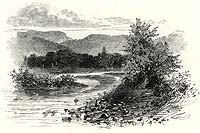
On The Esopus Near Phoenicia |
"I have told my story," says the Literary Fellow, with a quiet smile; "the burden of disproof lies with you."
"Yes," says Miss Polly, "sit right down and begin; no doubt we shall listen entranced!" with which remark she walks scornfully away.
"By the way, Captain Oldbore, we must be coming to some very interesting revolutionary ground now; no doubt this part of the river is teeming with historical associations." |
|
The old gentleman forgets his late rebuke under Miss Rutherford's gentle influence, and forthwith launches out into such a stream of anecdote and reminiscence and statistics as rivets that lady to his side willy-nilly. On past Kingston and Rondout they sail, where the massacre of Esopus and its burning by the British are treated at length, till Catskill village approaches. The entrance to the enchanted land is not far away now, and behold, its guardian lying asleep on the mountain tops!
Nearing Catskill as you come up the river, the gigantic outlines of a recumbent Indian are traceable in the contour of the mountains against the sky. He lies on his back, with his knees slightly drawn up, and arms folded across his breast. The elongation on top of his head has the appearance of a war-plume of feathers. The attitude is imposing in its grand serenity, and on those ideal mountain days, when great fluffy clouds go chasing across their wooded sides, playing hide-and-seek with the sunshine, we can easily appreciate how distinct the personality of this giant warrior became to the superstitious mind of the savage, as the shifting lights give him the appearance of slight movement, and even cause his breast to heave convulsively betimes. Of course he had his story; what hill, or valley, or appearance in nature, had not its reason for being in the misty shadow-land of the Indian's past?
|
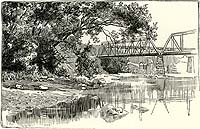
On Catskill Creek |
"Once on a time," Great Manitou's favorite children, the Iroquois tribes, were worrried and devoured by a giant until they could endure it no longer, neither vanquish him unaided, so they cast themselves on the mercy of the Great Spirit. They went up to his high places, and besought him, saying: "Great Father of us all, thou knowest we have done brave things! We have defended our lodges; we have given our lives; we have not been afraid; we have done according to thy command, and we are not strong enough. Oh! Chief of Warriors, slay this giant for us!"
|
|
So Manitou heard their prayer, and came among them in the form of a huge eagle, to deliver them. He found that the giant had devoured their corn so that their wives and children starved, and the breath of the dread creature was so foul that many died of wasting disease. Then Manitou engaged in a fierce conflict with the evil spirit, who had the appearance of an Indian, and at last vanquished him, but did not kill him. He, however, put him into a deep sleep, and chained him in the outline of his sacred hills, saying to his children, the tribes about their feet: "There shall he lie in slumber while ye are brave and fierce and strong, and therefore pleasing to me; but when I am angered against my children, I will wake him again, and he shall arise and destroy all things !
Thus pestilence and famine were taken from this favored people, and chained in Manitou's hunting-ground, and heaven's sunshine, rain, and breezes brought back plenty and health to this happy region. Surely, on these wind-blown hilltops, where, from snow till snow again, some spicy breath ever scents the air, whether of sweet-fern or flowers, or the hundred odors of the deep wood, the "Big Indian" can never wake and arise again.
Arrived at Catskill, the party was suddenly dropped into a howling babel, whereby any sane and clear-headed person might easily have been driven to sudden insanity ; but these travellers were old stagers, used to journevings by land and sea, and conse quently not readily confused. They wended their way, uninterrupted by any alluring cries of "This way, Sir! Cab, Sir?" "Carriage, Sir?- this way for Mountain View House!" "Only stage direct to the mountains!" With stern determination, they shook off these hackmen, who always know better than you do where you want to go, and got into the narrow-gauge train, in waiting for passengers bound for the mountains.
"There, now!" exclaimed Miss Perkins, as they passed on, " that poor old lady who said she wanted to go to Catskill Village, has resigned herself to those demons and they will tear her limb from limb!"
Unfortunately she had given herself to one cabby and her baggage to another, and thus chaos had ensued.
The office which the shrieking little engine resigned at Palenville, a huge mountain coach there assumed, and the party was transferred to it for the climb up the mountain side.
Oh, the loveliness of that ascent! Out of the dust and heat, by slow toiling, surely, and yet with evident progress, into a new world of verdure and cool breezes and great silence. There was only a hint now and then of vast reaches into space, for daylight was fast fleeing, to be replaced by the glimmer of a young moon, and, as the great ark of a stage lurched around a corner where the forest was cut away, the faint touch of silver on a sea of treetops below made their hearts beat with a sense of the depths just beyond.
Our tired travellers slept the sleep of the weary that night, and if strange visions of Rip Van Winkle's midnight revellers visited more than one pillow, what wonder? Had they not seen the inn to which he returned from his long sleep in this very clove, and the old sign swinging, on their way up, and all by the witching light of the young moon?
|
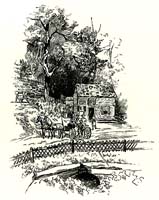
The Rip Van Winkle House
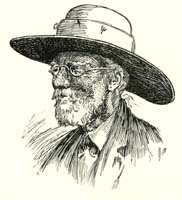
The Old German
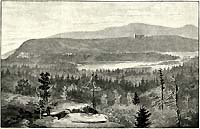
The View From North Mountain
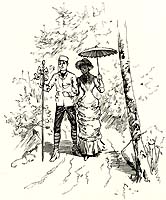
The Dude
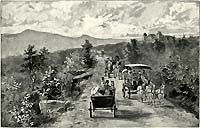
On The Road From Kaaterskill Hotel
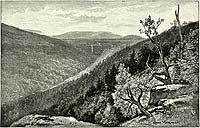
View From Sunset Rock
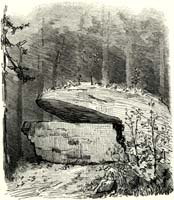
Alligator Rock
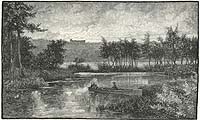
The Lakes
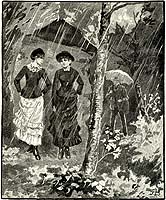
Sheltering Rock
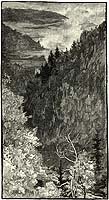
In Cauterskill Clove After Rain |
In spite of all that they were up betimes in the morning, and assembled in the parlor by appointment to go out to an eight o'clock breakfast. But where was pretty Polly? Surely, she of all people could not be wasting this precious holiday in sleep! Indeed not, for here she comes, a great bunch of hare-bells in her hands.
"Aha" she cries, "I have outdone you all, for I was up in time to see the sun rise, and see, I have a nosegay with mountain-dew on it."
Breakfast over, the next thing to do is North Mountain with its views. The day was one peculiarly characteristic of the mountains, hot, but with an occasional cool breeze to pat the cheek with a slightly frosty touch, and little white clouds sailing over the bluest of skies.
Toiling up the steep slope near Captain Oldbore was a stout old German gentleman with a pleasant, beaming face, out of which a pair of mild blue eyes looked through very short-sighted glasses. At some exclamation of surprise, he took occasion to say, "Then it ees Chet you are strange to these mountains?"
Being assured that such was the case, he continued :
"Oh, it ees not so with me! I am goming here now these dwenty years, and it is dangerous eff you will pe glimbing. It is many soomers I hev carried pendages and leeniment in my pockets for an eccident "... here he displayed a neat roll of linen and the bottle.
"What a dreadful apprehension!" shuddered one of the ladies.
Back toward the west, the view from the North Mountain is very fine, and no feature in it is more lovely than the tiny lakes nestling down in the shadows. On the dullest days they catch some remnant of light and flash it back to the hill-tops. Mrs, Schuyler felt that she could not go home without a nearer exploration of those lakes.
"Better not you won't find them so pretty nearer by, probably nothing but boggy little mud-holes."
It was the Artist who spoke, and his temerity was promptly punished by the general expression of a determination to investigate those bodies of water while at the Kaaterskill Hotel.
In the afternoon they transferred themselves to that house. There the ladies seated themselves on the broad veranda, while the male members of the party were absent in conclave with that august person, the hotel clerk.
The rueful groups soon returned, headed by Mr. Schuyler.
"Well, my dear," said that over-heated and rubicund individual, "I guess we're in for it. They 're all here - the Carrolls, the Beekmans, and fifty more besides, there's a hop to-night."
This last was added tentatively, in some fear of that imperious little lady who ruled his skies, for well he knew her aversion to summer parties and other full-dress frivolities in the " heated term." Each summer she carried off her submissive spouse to a pleasuring like this, with a few chosen spirits, for a rest, after the long winter when she served her turn at Society's wheel with the other social slaves. Now she leaned back in her chair and fanned herself gloomily.
Alas! the futility of those pretty dresses in the trunks! Each lady had brought a gown suitable to meet just such a possible contingency as this, but it was carried much as one takes an umbrella on a cloudy day, with a defiantly-held superstition that it may scare off the rain. Miss Rutherford, too, looked bored, but Miss Polly cried gayly, "Why, that 's delightful!"
So the hop came off, bringing pleasure to one of the ladies at least, and our pilgrims made their entrée once more into New York and Philadelphia and Boston at once, in the great drawingroom which seemed large enough to hold the entire population of the last-named city. All the many friends came flocking about, and the mutual surprises and greetings and exclamations were very numerous.
There was a band, of course, and waltzing, and some flirtation, no doubt, while just outside the long windows the moonlight had flooded the great world beneath their feet. Surely in that enchanted land down there, all wrapped in a silver mist where a shining ribbon wound along through the dim light showing the course of the river, surely there was no care, nor sorrow, nor heartache. What a wonderfully beautiful world it is after all, and how the cynics have abused it! A faint odor steals up through the still air, the moonlight has a kind of throb in it; verily those hills, rising far away there in the east, must be the Delectable Mountains. Here an "ill-boding crow," awakened from his midnight slumbers, comes flapping and croaking up the gorge, a window opens on the quiet corner and two people step out, bringing a flare of gaslight, the sound of brass instruments, and a scrap of society comment.
"You think her so quiet and pretty ? I assure you her conduct has been the gossip of the house this month past!"
Wake up, old world! You are an arrant humbug, no Arcadia after all, but just the same old evil-thinking and evil-speaking world you were before.
In the morning there was an energetic scramble over rocks and hills and through rocky ravines. Who can tell what those seven people saw from Sunset Rock? Each through his own mood saw his own picture, and long he never so deeply, not one peep could he get of what his neighbor might be finding there at the same moment. In the shifting lights and shades, the deep greens and suggestions of coming autumn, the Artist found much for his work, and carried home with him more than his portfolio held, while I doubt if Miss Rutherford's herbarium contains half the blossoms she picked by the way; as for the Literary Fellow, much was brewing in his head, of which he afterward gave to others but a portion, and that perhaps not of his best, for what is best in artistic impressions seldom gets translated after all, so that a man's work is always just behind his effort.
As for the tiny lakes they proved to be as lovely as they had promised. Nestling down between the surrounding peaks, they seemed fit abodes of peace. Around their shores tall reeds, cattails, calumus, and many others are ever nodding and bowing before the little breezes that shiver over the bosom of the water, while tall trees lean over as far as they dare in the marshy foothold, and throw deep shadows where trout can hide safely and water-fowl float secure in the early spring.Here these people rested in the shade, while the energetic Miss Polly and John Grant went cleaving the water in a sharp-nosed little boat after water-lilies that floated far out in mid-channel. Already there were forewarnings of a shower, at which they all rejoiced greatly, for a storm on these mountains gave promise of great beauty and grandeur entirely new to them. The necessary thing to do, therefore, was to make all haste to begin the prospective drive down to Palenville, for they were going there to engage rooms for the following day, and they wanted to observe the progress of the storm from the new road that leads down the mountains from the Kaaterskill House.
Midway on the descent the storm burst upon them, so the covered wagon drew up at one side of the road beneath some overhanging trees, and the inmates arranged themselves to enjoy the shower and yet preserve dry clothes. With a tremendous crashing and booming it came tearing down the narrow gorge. The rain seemed to advance in a gray column reaching from the earth up into the darkened heavens, and the wind rushed along as if through a funnel, with a fury redoubled from being confined by the mountain sides. The trees bent low their bared heads, their branches and leaves flying before the blast. The noise of the thunder was deafening as it reechoed from side to side of the deep ravine. As the storm was fierce, so it was of short duration, and soon the raincloud seemed to have passed over, while the sun broke forth above the waiting travellers, shining on the shower that was now beneath their feet. As they passed on down to the valley the trees, the wayside weeds and dripping vines, the very stones, glistened and shone under the dancing sunlight, while below them the clouds were scattering in little puffs like smoke, and distant mutterings brought word that the spectacle was over. |
|
Down they go rattling over the stones at a great pace, for Palenville and dinner are ahead and much must be done yet this day. Quarters secured for the night, arrangements made about receiving the baggage that is to be sent down, and dinner eaten with great zest but short ceremony, the horses are put to the wagon and they again ascend the mountain, this time by the old Kaaterskill Clove road, with the design of walking back through the ravine. "To the Laurel House," the order is given, and there is the chief delight of the day, for there is the sanctum, or rather the prison and keep of the far-famed "Kaaterskill fall."
"How prosaic, how vulgar" cries Mrs. Schuyler, "to walk down wooden steps in a spot like this! Oh, I really can't - I much prefer clambering down some other way!"
"Well, you'll think differently when you come up," suggested her husband."
Down at the bottom of the ravine they look up at the amphitheatre almost covered with dripping mosses, and fringed at top with drooping pines. It is all very lovely, but pretty Miss Polly voices a general sentiment when she exclaims disappointedly "Is that all there is of it? That little thread of water?
|
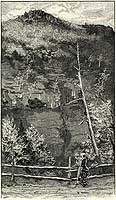
Artist Rock And Palenville Overlook
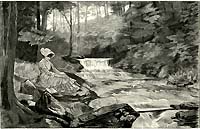
Mary's Glen Near Laurel House
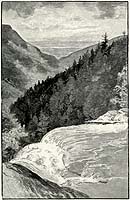
On Top Of Haines Falls
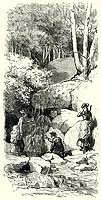
Dripping Rock
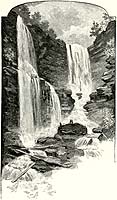
Haines Falls
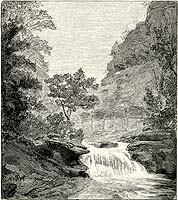
Artist Grotto
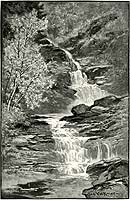
The Cascades Of Haines Falls
|
Indeed it did seem a very little stream to make such a fuss about. The Artist smiled; he had been here before and knew the trick.
"Come down," he said, "under the lower fall, and then look up."
From that point the little house built just above the precipice looked like a tiny bird-cage.
"Oh, look now!" cries Miss Polly clapping her hands with pleasure. High up in the air a white cloudy mass springs far out and falls in a foaming torrent. Down, down it comes till at the foot of the first fall it strikes the glassy surface of the pool, and rushes through it like a white snake. Over the second and smaller fall it comes and falls at their very feet in a drenching shower of spray. It is a humiliating thought that this beautiful mountain stream should be dammed up and turned on at twenty-five cents a piece for the lovers of nature, but we should have only the little thread of water all summer otherwise, whereas now for a consideration we get all the majesty of the spring floods let on.
"It must have looked like that the first time it came down over that rock."
"What do you mean?" said Miss Rutherford, looking for his explanation to the Literary Fellow; "was it not always here?"
"You do not then know the legend?"
"Tell it... tell it! demands Miss Perkins eagerly, while Captain Oldbore looks impatient at such an absurd proposal.
"It is too long to tell now, but this evening, if you wish..."
"Of course," breaks in Mrs. Schuyler, the shower has cooled the air so that we shall need a fire on the hearth this evening, and I saw a place for one at our boarding-house. That will be just the thing!"
Captain Oldbore said something about a little paper on revolutionary days he had hoped to read them tonight.
"By all means," consents the amiable lady, "we will make that sort of thing the feature of our evenings."
Miss Perkins is no longer able to restrain her feelings at the prospect of an evening with what promises to be a dreary feast of facts.
"Now, my dear captain, this region is sacred to the Indian, and I must beg that you will not intrude your pushing and uninteresting whites till we are safely at home!"
Miss Rutherford averted any further trouble and smoothed down the old man's ruffled vanity by calling him aside to give an opinion on the family name of a pretty vetch that clung to the rocks near by.
Now for Haines' Falls and that gorge, stopping by the way at Dripping Rock and at the Land Slide for the prettiest of views down the winding clove. At Hainesville the wagon is dismissed and they begin their scramble down through the rocky gorge. Fawn's Leap, Buttermilk Falls, and Belle Falls come each in turn, and each holds its own peculiar attraction undimmed by the rest. Not far from Palenville the ravine widens into a little valley, and the stream is bordered by wide stretches of green turf. Square ridges of green grass surround old cellars partially filled with rubbish, over which wild black berry vines run riot and cover the unsightliness. Golden-rod, and purple asters choke the doorways, and clumps of old-fashioned garden annuals mingle their sweetness with the tall grass; sweet-williams, pinks, and now and then a shrub, where the path must have led to the door. This is a veritable "Deserted Village," and here Captain Oldbore's facts began to prove useful. He told them it was the ruins of an old tannery with its settlement of workmen's cottages. Tanning hides was once the most flourishing industry of all this region, but as the hemlock bark was exhausted it died a natural death. Acres upon acres of trees are felled, stripped, and left, the parching summer wind dries the dead wood to tinder, and then some chance spark sets going a conflagration that sometimes lasts for weeks in the autumn gales.
"Sir," concludes the excited captain, now in full tilt on one of his hobbies "Sir, we are a most unthrifty, wasteful people! Thus, from year to year, we recklessly devastate our forests, lay bare the sources of our streams, and so are gradually changing the climate itself!"
Pleasant, indeed, was the fire that night as they all gathered about it in the big Palenville boarding-house. There was a frosty touch in the air and they spread their hands to the blaze with a genuine sense of comfort.
"Now for the legend, Mr. Grant," and Mrs. Schuyler settles back in her comfortable chair; " you know you promised!"
And thus, by the flickering light of a fire on the hearth, they listened to...
|
|
|







